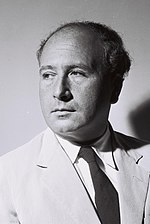Walter Eytan
[4] Eytan and his brother, Ernest Ettinghausen, played important roles in the codebreaking effort, which Walter described in a contribution to a 1992 book on Bletchley.
[5] After World War II, Walter was one of a number of Jewish codebreakers at Bletchley who went on to play a key role in establishing the new State of Israel.
He was also the first principal of the Jewish Agency's Public Service College, established in 1946, which started with twenty-five students including five women.
"[11] On 16 March 1949 he was with Moshe Dayan and Yigael Yadin during an all night meeting with King Abdullah at his palace, El Shuneh, close to the Dead Sea.
[17] In December 1949 he asked the Israeli Army to stop mass deportations of Palestinians since large groups resulted in complaints being raised with the Mixed Armistice Commission.
[20] In 1951 he was a member of a four-man committee, including Yigal Yadin, Reuven Shiloah and Moshe Sharett, set up to consider special operations outside the borders of Israel.
On 1 September 1951 a new department was created reporting directly to the Prime Minister – the Central Institute for Intelligence and Special Missions, known as Mossad.
The long-term decline of the Foreign Ministry's Research department and its inability to make its own intelligence assessments was one of the major findings of the 1974 Commission of inquiry into failings leading up to the 1973 war.
[22] By 1958 the Foreign Service consisted of 682 officials, 427 of whom were local to whichever state; there were 12 ambassadors, 15 ministers, 1 diplomatic representative, 3 charge d'affairs and 37 consuls-general and consuls.
[24] 24 May 1967 Eytan arranged at very short notice a meeting in Paris between Foreign Minister Abba Eban and President General Charles de Gaulle to explain Israel's views on the growing crisis with Egypt.


